Iran Summons Afghan Chargé D'affaires Over Tensions
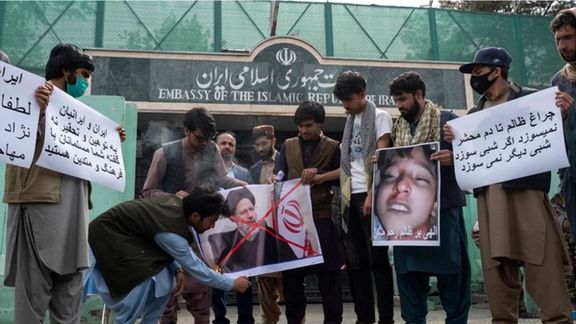
Iran summoned Afghanistan’s chargé d'affaires over an attack Herat consulate on Monday, and suspended services of all its consular missions across the country.

Iran summoned Afghanistan’s chargé d'affaires over an attack Herat consulate on Monday, and suspended services of all its consular missions across the country.
The head of the South Asia Department at Iran’s Foreign Ministry, Rasoul Mousavi, said on Tuesday that the missions of the Islamic Republic will resume their services once Afghanistan ensures their security.
Protestors Monday attacked the Iranian consulate in Herat, Afghanistan, hurling stones, smashing security cameras, and burning tires before they were dispersed by Taliban security. Earlier on Monday, demonstrators outside Iran’s embassy in Kabul held banners with pictures of refugees and the words "Isn't Afghan a human being?"
Interior Minister Ahmad Vahidi also said on Tuesday that the attacks have been organized by “the enemy” and aimed at sowing discord between Iran and Afghanistan.
Warning of efforts on social media to whip up anti-Iranian sentiment over alleged mistreatment of Afghan immigrants in Iran, foreign ministry spokesman Saeed Khatibzadeh called on Taliban officials to ensure the security of Iran’s embassy in Kabul and its missions across Afghanistan.
Sectarian tensions have risen since last week’s killing of two Shia clerics in Imam Reza shrine, Mashhad, attributed to an Afghan migrant. Many Afghans are in Iran unofficially, with numbers increasing since the Taliban took Kabul last year as the United States ended its 20-year military presence.
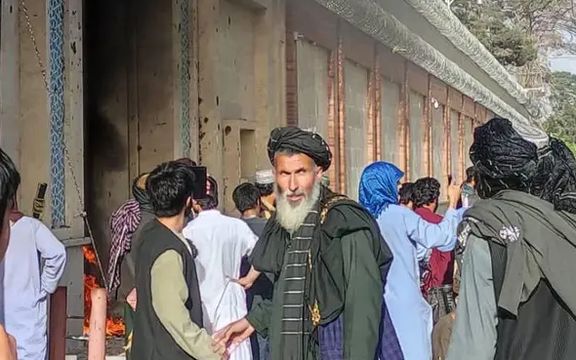
Tehran on Tuesday summoned the Afghan chargé d'affaires to protest an attack on its consulate in Herat on Monday and halted consular services in Afghanistan.
According to a statement published on the its website, the ministry's director-general for South Asia told the Afghan chargé d'affaires that Tehran will not resume its consular services before receiving assurances from Afghan authorities over protection of its diplomatic missions in Afghanistan. The Iranian official also demanded punishment of those behind the attack.
Protesters on Monday set fire to tires in front of the Iranian consulate in Herat, pelted the building, burned the Iranian flag, and destroyed security cameras. Taliban forces reportedly dispersed the angry Afghan crowd by firing shots in the air.
According to Afghanistan's TOLOnews, dozens of Afghans protested against Iran in Kabul and the south-eastern province of Khost. A banner carried by protesters in Kabul Monday said "Stop Killing Afghans" while another said Afghans will never forget the mistreatment of their compatriots in Iran. A video published on Twitter by Afghanistan's Aamaj News shows protesters marching in front of the Herat consulate and chanting "Death to Iran".
Tensions between Iranians and Afghans have risen since last week’s killing of two Shiite clerics at Imam Reza shrine, Mashhad, reportedly by an Afghan national.
Following the attack some videos began circulating on social media to portray mistreatment of Afghans by Iranians. The videos alleged that some Afghans had been verbally, physically, and sexually abused by Iranian mobs, border guards and police. The authenticity and time of the videos cannot be independently verified.
In an interview with Afghanistan's TOLOnews on Monday, the Iranian envoy to Kabul, Bahador Aminian, claimed that the Mujahedin-e Khalq, a group based outside Iran and considered as a terrorist group by Tehran, was behind the dissemination of the provocative videos on social media to ruin Tehran-Kabul relations.
Tasnim news agency which is affiliated to Iran's Revolutionary Guards (IRGC) on Monday claimed that "western-backed" political groups in Afghanistan were behind the recent events and have called for more protests against Iran in the coming days.
At his weekly press briefing on Monday, after the attack on the consulate in Herat, Iran's foreign ministry spokesman, Saeed Khatibzadeh, said the influx of Afghan refugees to Iran cannot continue considering Iran's limited capacities and urged the Taliban to exercise responsibility and to protect Iranian diplomatic venues in Herat and other Afghan cities.
Khatibzadeh also said there were plots by "certain ill-wishers" to foment Iranophobia in Afghanistan and Afghan-phobia in Iran.
The Taliban foreign ministry on Friday said it had summoned officials of the Iranian embassy in Kabul in connection with "abuses against Afghan refugees in Iran" following the recent stabbing of Iranian clerics in Mashhad.
Last week Foreign Minister Hossein Amir-Abdollahian said since the Taliban took power in August last year one million more Afghans have entered Iran, bringing the number of refugees and economic migrant to five million.
Thousands of Afghans fleeing the economic hardships under the Taliban enter Iran daily from official border points or illegally from other areas along the 900 km border to find work in Iran to support their families back home or to continue their journey towards Europe.
Some officials claim as many as 5,000 Afghans a day have been entering the country in recent months.
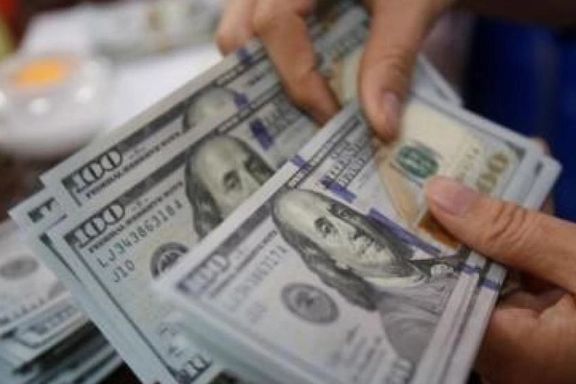
A US official has denied Iranian media reports that $7 billion of Iran’s frozen funds will be freed in exchange for the release of three American dual citizens held as hostages.
An unnamed senior State Department official said on Monday that “We have two separate negotiations underway with Iran: one for a mutual return to full implementation of the JCPOA and one on the release of all four US citizens unjustly detained in Iran”, noting that “At this stage, neither negotiation has been successfully concluded”.
“Any reports otherwise, including reports about the transfer of Iranians funds are false. Our partners have not released these restricted funds to Iran, nor has US authorized transfer,” the source said.
Warning of Iran’s propaganda campaign that regularly suggests progress on agreements to prop up its currency, the source said that such reports usually appear whenever the Iranian rial is under strong market pressure, adding that there is “no reason to think any different this time”
Iran’s currency hit a new low against the US dollar in over two months, as nuclear talks remained deadlocked.
“Given the sensitivity, we urge caution in relying on anything other than official" US confirmation on this topic, the source added.
“We are continuing to approach these negotiations with the utmost urgency and urge Iran to do the same. Iran must allow US citizens Baquer (Bagher) and Siamak Namazi, Emad Shargi, and Morad Tahbaz to return home to their loved ones”.
Iran official government news website, IRNA reported Monday that a senior foreign official would visit Iran on Tuesday to conclude a deal to free the frozen funds. The foreign ministry immediately denied the claim.
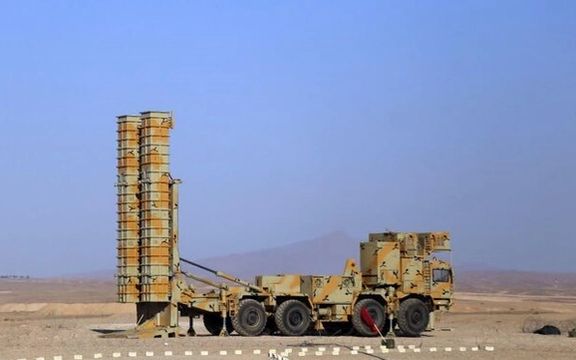
Iranian weapons-trafficking networks are reportedly helping to smuggle munitions and military hardware sourced from Iraq to Russia for its military campaign in Ukraine.
The Guardian quoted Iranian-backed Iraqi militias and regional intelligence services Tuesday as saying that the undercover networks were used in the past month to supply rocket-propelled grenades (RPGs), anti-tank missiles and Brazilian-designed rocket launcher systems.
The RPGs and anti-tank missiles were in the possession of Hashd al-Shaabi, the most powerful Shiite militia umbrella group, and were transported to Iran through the Shalamcheh border crossing since March 26, where they were received by the Iranian military and taken on to Russia by sea, a commander of the militia branch that controls the crossing told the British newspaper.
A source within Ḥashd al-Shaabi said the organization also sent in pieces two Brazilian-designed Astros II rocket launcher systems, known in Iraq as the license-built version Sajil-60, to Iran on April 1.
The equipment was loaded on three cargo ships – two Russian flagged and one Iranian flagged – and crossed the Caspian Sea from Iran’s port of Bandar Anzali to Astrakhan in southern Russia.
A source who helped organize the transport said the Iranian authorities had also donated an Iranian-made Bavar 373 missile system, which is similar to Russia’s S-300, to Moscow. Tehran also returned an S-300 to Russia, the source said.
Last Friday, The Telegraph reported that Russia is running out of some weapons because critical parts were made in Ukraine, including Kh-55 nuclear capable cruise missiles that are also used by Iran and China.
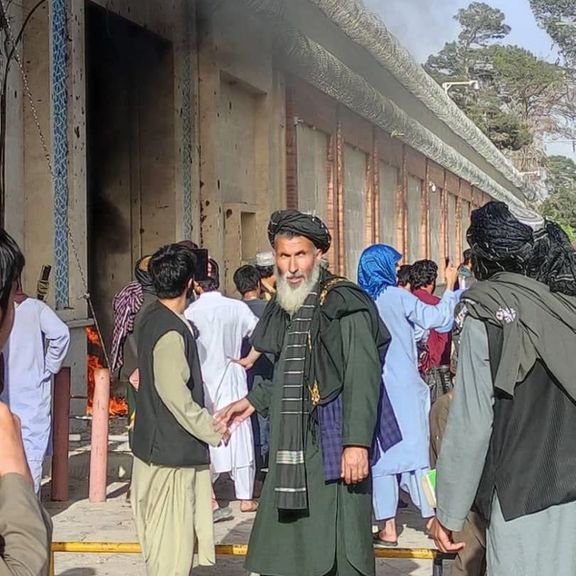
Protestors Monday attacked the Iranian consulate in Herat, Afghanistan, hurling stones, smashing security cameras, and burning tires before they were dispersed by Taliban security.
Iranian foreign ministry spokesman Saeed Khatibzadeh called on Taliban officials to ensure the security of Iran’s embassy in Kabul and its missions across Afghanistan. He warned of efforts on social media to whip up anti-Iranian sentiment over alleged mistreatment of Afghan immigrants in Iran.
Sectarian tensions have risen since last week’s killing of two Shia clerics in Imam Reza shrine, Mashhad, attributed to Sunni extremists. Many Afghans are in Iran unofficially, with numbers increasing since the Taliban took Kabul last year as the United States ended its 20-year military presence.
A conservative newspaper in Tehran claimed Thursday that 8 million Afghans were in Iran, and that the Mashhad knife attack reflected Iranian authorities’ lax approach in allowing violent extremists amid refugees. Jomhuri Eslami reminded readers of the Taliban’s past anti-Shia animosity and said there was no difference between the group and Isis-Daesh, the Islamic State group.
Earlier on Monday, demonstrators outside Iran’s embassy in Kabul held banners with pictures of refugees and the words "Isn't Afghan a human being?"
Ambassador Bahador Aminian met in recent days with Afghan acting foreign minister Amir Khan Muttaqi and former president Hamid Karzai, presumably to further Iran’s hopes of a broad-based government.
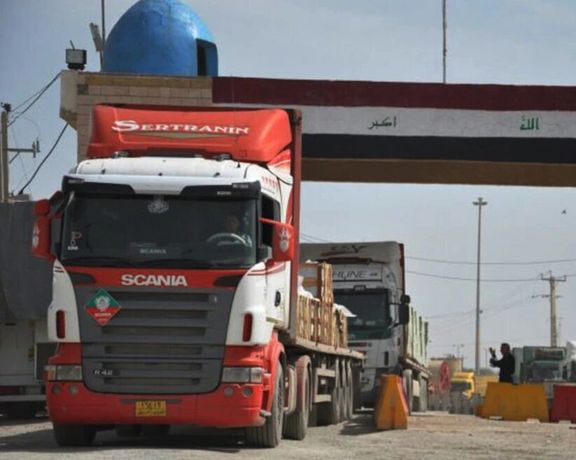
Iraqi authorities were forced Saturday by people to open the Shalamcheh border crossing to Iranian trucks without inspections or usual administrative processes.
The border crossing is north of Iran’s oil center Abadan and close to Iraq’s Basra province.
The move came after Iraqis stormed the crossing and removed barriers. With around a quarter of Iraq’s population below the poverty line − around double that in Basra province − and the Iranian rial relatively low, hundreds had gathered on the Iraqi side to protest against the authorities barring the import of competitively priced items including potatoes, tomato, eggplants and carrots.
Following the protests, an official in Iraq’s customs administration ordered staff to expedite procedures at the crossing for the entry of agricultural and food products.
Iran’s policy of subsidizing food products and gasoline has long encouraged their export to neighboring countries with higher prices, whether through ‘legitimate’ channels or smuggling. Iraq has just announced a new electronic system aimed at monitoring border trade, including at the five official crossings along its 1,600km frontier with Iran.